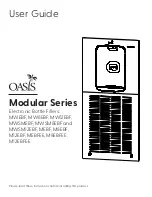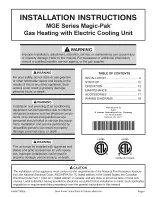
Installation & Operation Manual
54
10
Start-up
Final checks before starting the water
heater
Read the Armor Water Heater Service Manual to
familiarize yourself with SMART SYSTEM control
module operation. Read this manual, pages 55 and 56
for proper steps to start the water heater.
Verify the water heater and system are full of water and
all system components are correctly set for operation.
Verify the preparation procedures of Section 10, pages 53
and 54 have been completed.
Fill the vent condensate trap with water (removing the
retaining screw in order to remove the 2 inch PVC cap
with the switch located at the top of the trap). Replace
the cap. Press the cap onto the trap until the cap makes
contact with the drain. Replace the retaining screw.
Verify electrical connections are correct and securely
attached.
Inspect vent piping and air piping for signs of deterioration
from corrosion, physical damage or sagging. Verify air
piping and vent piping are intact and correctly installed
per this manual.
Start the water heater
1. Read and follow the Operating instructions in FIG.’s 10-2
and 10-3, pages 55 and 56.
If water heater does not start correctly
1. Check for loose connections, blown fuse or service switch
off?
2. Is water heater water temperature above 200°F?
3. Is tank thermostat or tank set point set below room
temperature?
4. Is gas turned on at meter or water heater?
5. Is incoming gas pressure less than 4 inches w.c.?
If none of the above corrects the problem, refer to the
Troubleshooting Section of the Armor Water Heater Service
Manual.
Check system and water heater
Check water piping
1. Check system piping for leaks. If found, shut down the
water heater and repair immediately. (See WARNINGS
on pages 53 and 54 (startup) regarding failure to repair
leaks.)
2. Check Delta T. Reference Section 6 -
System Piping
on
page 38 for more information regarding Delta T.
3. Vent any remaining air from the system using manual
vents. Air in the system will interfere with circulation and
cause heat distribution problems and noise.
Check vent piping and air piping
1. Check for gastight seal at every connection, seam of air
piping, and vent piping.
Venting system must be sealed gastight
to prevent flue gas spillage and carbon
monoxide emissions, which will result in
severe personal injury or death.
Check gas piping
1. Check around the water heater for gas odor following
the procedure on page 44 of this manual
(Connecting Gas
Supply Piping)
.
If you discover evidence of any gas leak,
shut down the water heater at once. Find
the leak source with a bubble test and repair
immediately. Do not start the water heater
again until corrected. Failure to comply
could result in severe personal injury, death,
or substantial property damage.
Propane water heaters – verify conversion
1. Verify propane conversion has been completed per the
Propane Conversion instructions.
DO NOT adjust or attempt to measure
gas valve outlet pressure. The gas valve is
factory-set for the correct outlet pressure.
This setting is suitable for natural gas and
propane, requiring no field adjustment.
Attempting to alter or measure the gas valve
outlet pressure could result in damage to
the valve, causing potential severe personal
injury, death, or substantial property
damage.
Check flame and combustion
1. Turn the main power off to the water heater by placing the
“On/Off” switch in the OFF position.
2. Remove the flue temperature sensor from the flue pipe
connection.
Note:
Combustion measurements will be
made at this point.
3. Turn the main power on to the water heater by placing the
“On/Off” switch in the ON position.
WARNING
WARNING
WARNING
WARNING
Armor water heaters are typically shipped
ready to fire on natural gas. Check water
heater rating plate to determine which
fuel the water heater is set for. If set to
natural gas, it may be converted to LP by
installing an orifice or by making a gas valve
adjustment (see pages 13 thru 15). In order
to operate on LP gas, an orifice MUST BE
installed or a gas valve adjustment MUST
BE made. Failure to comply could result in
severe personal injury, death, or substantial
property damage.
















































